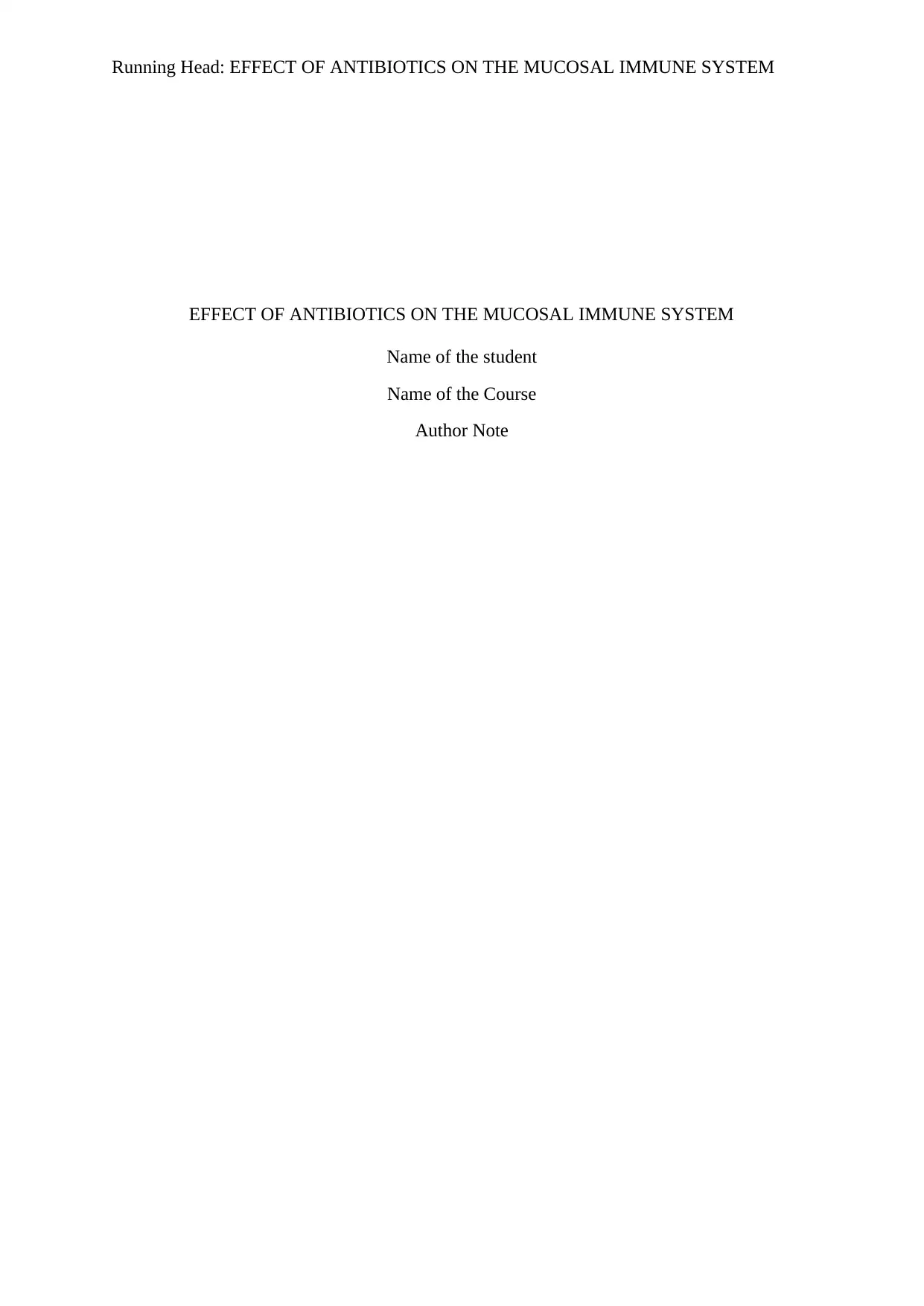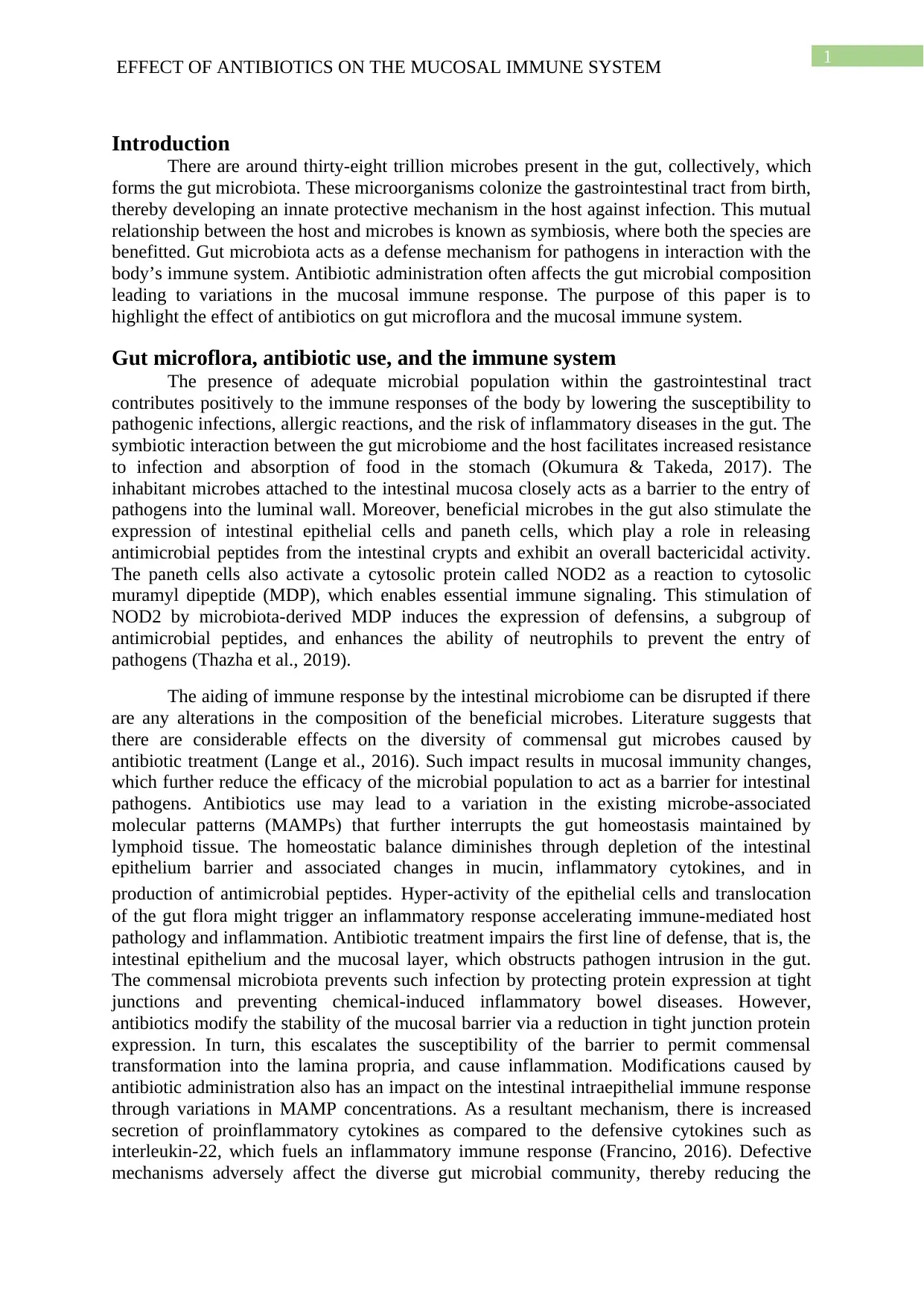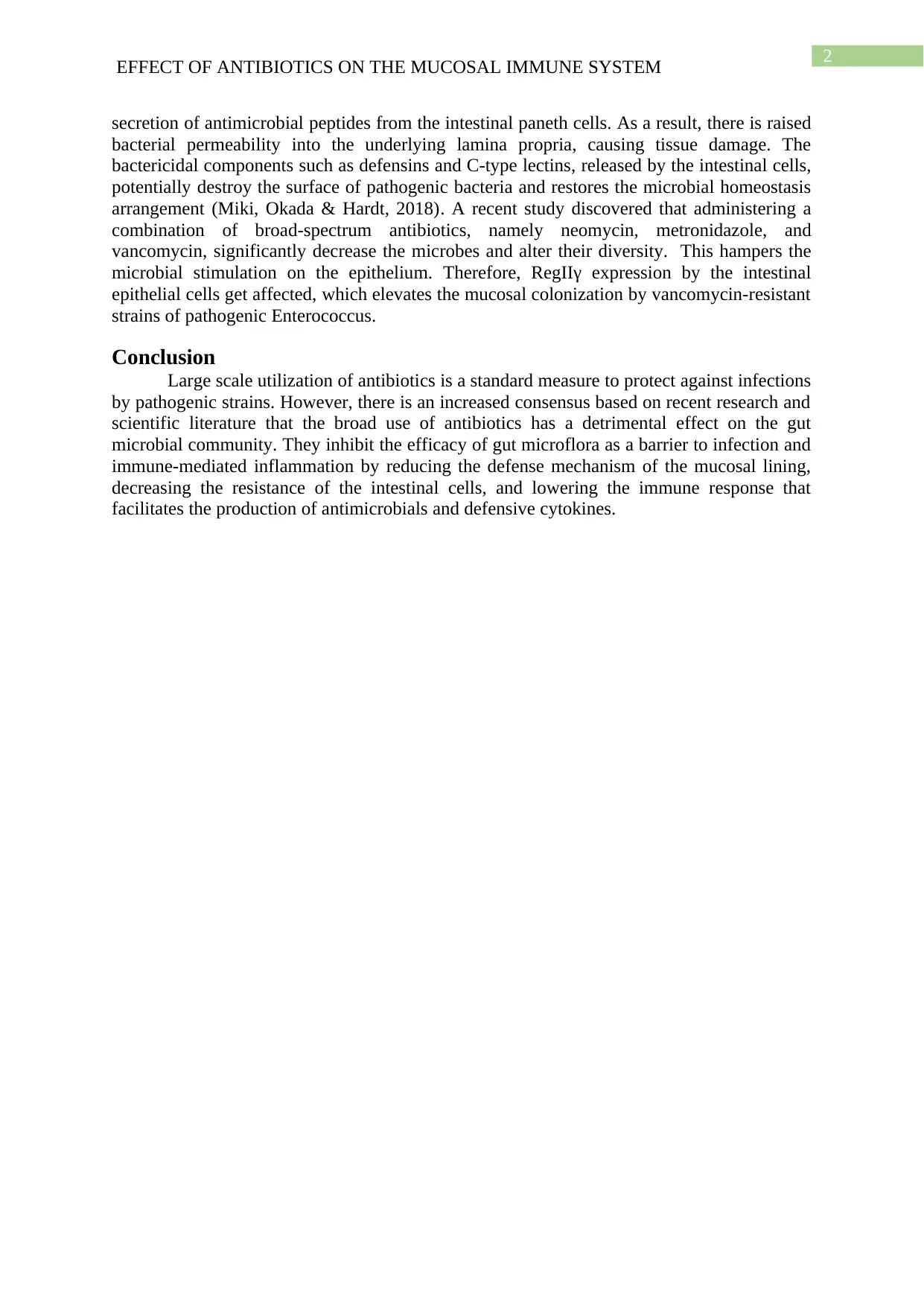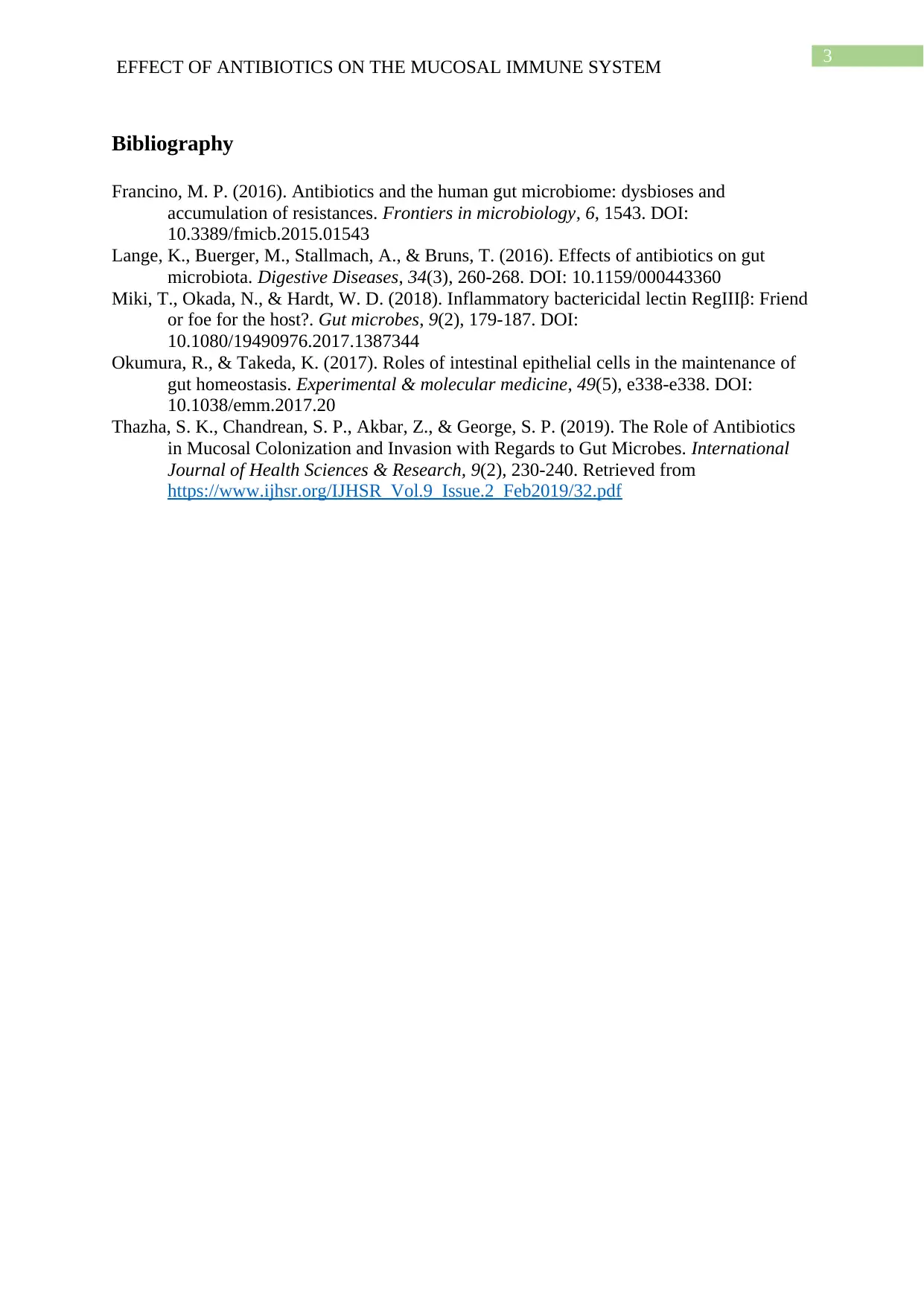Effect of Antibiotics on the Mucosal Immune System.
VerifiedAdded on 2022/08/28
|4
|1115
|23
AI Summary
Contribute Materials
Your contribution can guide someone’s learning journey. Share your
documents today.

Running Head: EFFECT OF ANTIBIOTICS ON THE MUCOSAL IMMUNE SYSTEM
EFFECT OF ANTIBIOTICS ON THE MUCOSAL IMMUNE SYSTEM
Name of the student
Name of the Course
Author Note
EFFECT OF ANTIBIOTICS ON THE MUCOSAL IMMUNE SYSTEM
Name of the student
Name of the Course
Author Note
Secure Best Marks with AI Grader
Need help grading? Try our AI Grader for instant feedback on your assignments.

1
EFFECT OF ANTIBIOTICS ON THE MUCOSAL IMMUNE SYSTEM
Introduction
There are around thirty-eight trillion microbes present in the gut, collectively, which
forms the gut microbiota. These microorganisms colonize the gastrointestinal tract from birth,
thereby developing an innate protective mechanism in the host against infection. This mutual
relationship between the host and microbes is known as symbiosis, where both the species are
benefitted. Gut microbiota acts as a defense mechanism for pathogens in interaction with the
body’s immune system. Antibiotic administration often affects the gut microbial composition
leading to variations in the mucosal immune response. The purpose of this paper is to
highlight the effect of antibiotics on gut microflora and the mucosal immune system.
Gut microflora, antibiotic use, and the immune system
The presence of adequate microbial population within the gastrointestinal tract
contributes positively to the immune responses of the body by lowering the susceptibility to
pathogenic infections, allergic reactions, and the risk of inflammatory diseases in the gut. The
symbiotic interaction between the gut microbiome and the host facilitates increased resistance
to infection and absorption of food in the stomach (Okumura & Takeda, 2017). The
inhabitant microbes attached to the intestinal mucosa closely acts as a barrier to the entry of
pathogens into the luminal wall. Moreover, beneficial microbes in the gut also stimulate the
expression of intestinal epithelial cells and paneth cells, which play a role in releasing
antimicrobial peptides from the intestinal crypts and exhibit an overall bactericidal activity.
The paneth cells also activate a cytosolic protein called NOD2 as a reaction to cytosolic
muramyl dipeptide (MDP), which enables essential immune signaling. This stimulation of
NOD2 by microbiota-derived MDP induces the expression of defensins, a subgroup of
antimicrobial peptides, and enhances the ability of neutrophils to prevent the entry of
pathogens (Thazha et al., 2019).
The aiding of immune response by the intestinal microbiome can be disrupted if there
are any alterations in the composition of the beneficial microbes. Literature suggests that
there are considerable effects on the diversity of commensal gut microbes caused by
antibiotic treatment (Lange et al., 2016). Such impact results in mucosal immunity changes,
which further reduce the efficacy of the microbial population to act as a barrier for intestinal
pathogens. Antibiotics use may lead to a variation in the existing microbe-associated
molecular patterns (MAMPs) that further interrupts the gut homeostasis maintained by
lymphoid tissue. The homeostatic balance diminishes through depletion of the intestinal
epithelium barrier and associated changes in mucin, inflammatory cytokines, and in
production of antimicrobial peptides. Hyper-activity of the epithelial cells and translocation
of the gut flora might trigger an inflammatory response accelerating immune-mediated host
pathology and inflammation. Antibiotic treatment impairs the first line of defense, that is, the
intestinal epithelium and the mucosal layer, which obstructs pathogen intrusion in the gut.
The commensal microbiota prevents such infection by protecting protein expression at tight
junctions and preventing chemical-induced inflammatory bowel diseases. However,
antibiotics modify the stability of the mucosal barrier via a reduction in tight junction protein
expression. In turn, this escalates the susceptibility of the barrier to permit commensal
transformation into the lamina propria, and cause inflammation. Modifications caused by
antibiotic administration also has an impact on the intestinal intraepithelial immune response
through variations in MAMP concentrations. As a resultant mechanism, there is increased
secretion of proinflammatory cytokines as compared to the defensive cytokines such as
interleukin-22, which fuels an inflammatory immune response (Francino, 2016). Defective
mechanisms adversely affect the diverse gut microbial community, thereby reducing the
EFFECT OF ANTIBIOTICS ON THE MUCOSAL IMMUNE SYSTEM
Introduction
There are around thirty-eight trillion microbes present in the gut, collectively, which
forms the gut microbiota. These microorganisms colonize the gastrointestinal tract from birth,
thereby developing an innate protective mechanism in the host against infection. This mutual
relationship between the host and microbes is known as symbiosis, where both the species are
benefitted. Gut microbiota acts as a defense mechanism for pathogens in interaction with the
body’s immune system. Antibiotic administration often affects the gut microbial composition
leading to variations in the mucosal immune response. The purpose of this paper is to
highlight the effect of antibiotics on gut microflora and the mucosal immune system.
Gut microflora, antibiotic use, and the immune system
The presence of adequate microbial population within the gastrointestinal tract
contributes positively to the immune responses of the body by lowering the susceptibility to
pathogenic infections, allergic reactions, and the risk of inflammatory diseases in the gut. The
symbiotic interaction between the gut microbiome and the host facilitates increased resistance
to infection and absorption of food in the stomach (Okumura & Takeda, 2017). The
inhabitant microbes attached to the intestinal mucosa closely acts as a barrier to the entry of
pathogens into the luminal wall. Moreover, beneficial microbes in the gut also stimulate the
expression of intestinal epithelial cells and paneth cells, which play a role in releasing
antimicrobial peptides from the intestinal crypts and exhibit an overall bactericidal activity.
The paneth cells also activate a cytosolic protein called NOD2 as a reaction to cytosolic
muramyl dipeptide (MDP), which enables essential immune signaling. This stimulation of
NOD2 by microbiota-derived MDP induces the expression of defensins, a subgroup of
antimicrobial peptides, and enhances the ability of neutrophils to prevent the entry of
pathogens (Thazha et al., 2019).
The aiding of immune response by the intestinal microbiome can be disrupted if there
are any alterations in the composition of the beneficial microbes. Literature suggests that
there are considerable effects on the diversity of commensal gut microbes caused by
antibiotic treatment (Lange et al., 2016). Such impact results in mucosal immunity changes,
which further reduce the efficacy of the microbial population to act as a barrier for intestinal
pathogens. Antibiotics use may lead to a variation in the existing microbe-associated
molecular patterns (MAMPs) that further interrupts the gut homeostasis maintained by
lymphoid tissue. The homeostatic balance diminishes through depletion of the intestinal
epithelium barrier and associated changes in mucin, inflammatory cytokines, and in
production of antimicrobial peptides. Hyper-activity of the epithelial cells and translocation
of the gut flora might trigger an inflammatory response accelerating immune-mediated host
pathology and inflammation. Antibiotic treatment impairs the first line of defense, that is, the
intestinal epithelium and the mucosal layer, which obstructs pathogen intrusion in the gut.
The commensal microbiota prevents such infection by protecting protein expression at tight
junctions and preventing chemical-induced inflammatory bowel diseases. However,
antibiotics modify the stability of the mucosal barrier via a reduction in tight junction protein
expression. In turn, this escalates the susceptibility of the barrier to permit commensal
transformation into the lamina propria, and cause inflammation. Modifications caused by
antibiotic administration also has an impact on the intestinal intraepithelial immune response
through variations in MAMP concentrations. As a resultant mechanism, there is increased
secretion of proinflammatory cytokines as compared to the defensive cytokines such as
interleukin-22, which fuels an inflammatory immune response (Francino, 2016). Defective
mechanisms adversely affect the diverse gut microbial community, thereby reducing the

2
EFFECT OF ANTIBIOTICS ON THE MUCOSAL IMMUNE SYSTEM
secretion of antimicrobial peptides from the intestinal paneth cells. As a result, there is raised
bacterial permeability into the underlying lamina propria, causing tissue damage. The
bactericidal components such as defensins and C-type lectins, released by the intestinal cells,
potentially destroy the surface of pathogenic bacteria and restores the microbial homeostasis
arrangement (Miki, Okada & Hardt, 2018). A recent study discovered that administering a
combination of broad-spectrum antibiotics, namely neomycin, metronidazole, and
vancomycin, significantly decrease the microbes and alter their diversity. This hampers the
microbial stimulation on the epithelium. Therefore, RegIIγ expression by the intestinal
epithelial cells get affected, which elevates the mucosal colonization by vancomycin-resistant
strains of pathogenic Enterococcus.
Conclusion
Large scale utilization of antibiotics is a standard measure to protect against infections
by pathogenic strains. However, there is an increased consensus based on recent research and
scientific literature that the broad use of antibiotics has a detrimental effect on the gut
microbial community. They inhibit the efficacy of gut microflora as a barrier to infection and
immune-mediated inflammation by reducing the defense mechanism of the mucosal lining,
decreasing the resistance of the intestinal cells, and lowering the immune response that
facilitates the production of antimicrobials and defensive cytokines.
EFFECT OF ANTIBIOTICS ON THE MUCOSAL IMMUNE SYSTEM
secretion of antimicrobial peptides from the intestinal paneth cells. As a result, there is raised
bacterial permeability into the underlying lamina propria, causing tissue damage. The
bactericidal components such as defensins and C-type lectins, released by the intestinal cells,
potentially destroy the surface of pathogenic bacteria and restores the microbial homeostasis
arrangement (Miki, Okada & Hardt, 2018). A recent study discovered that administering a
combination of broad-spectrum antibiotics, namely neomycin, metronidazole, and
vancomycin, significantly decrease the microbes and alter their diversity. This hampers the
microbial stimulation on the epithelium. Therefore, RegIIγ expression by the intestinal
epithelial cells get affected, which elevates the mucosal colonization by vancomycin-resistant
strains of pathogenic Enterococcus.
Conclusion
Large scale utilization of antibiotics is a standard measure to protect against infections
by pathogenic strains. However, there is an increased consensus based on recent research and
scientific literature that the broad use of antibiotics has a detrimental effect on the gut
microbial community. They inhibit the efficacy of gut microflora as a barrier to infection and
immune-mediated inflammation by reducing the defense mechanism of the mucosal lining,
decreasing the resistance of the intestinal cells, and lowering the immune response that
facilitates the production of antimicrobials and defensive cytokines.

3
EFFECT OF ANTIBIOTICS ON THE MUCOSAL IMMUNE SYSTEM
Bibliography
Francino, M. P. (2016). Antibiotics and the human gut microbiome: dysbioses and
accumulation of resistances. Frontiers in microbiology, 6, 1543. DOI:
10.3389/fmicb.2015.01543
Lange, K., Buerger, M., Stallmach, A., & Bruns, T. (2016). Effects of antibiotics on gut
microbiota. Digestive Diseases, 34(3), 260-268. DOI: 10.1159/000443360
Miki, T., Okada, N., & Hardt, W. D. (2018). Inflammatory bactericidal lectin RegIIIβ: Friend
or foe for the host?. Gut microbes, 9(2), 179-187. DOI:
10.1080/19490976.2017.1387344
Okumura, R., & Takeda, K. (2017). Roles of intestinal epithelial cells in the maintenance of
gut homeostasis. Experimental & molecular medicine, 49(5), e338-e338. DOI:
10.1038/emm.2017.20
Thazha, S. K., Chandrean, S. P., Akbar, Z., & George, S. P. (2019). The Role of Antibiotics
in Mucosal Colonization and Invasion with Regards to Gut Microbes. International
Journal of Health Sciences & Research, 9(2), 230-240. Retrieved from
https://www.ijhsr.org/IJHSR_Vol.9_Issue.2_Feb2019/32.pdf
EFFECT OF ANTIBIOTICS ON THE MUCOSAL IMMUNE SYSTEM
Bibliography
Francino, M. P. (2016). Antibiotics and the human gut microbiome: dysbioses and
accumulation of resistances. Frontiers in microbiology, 6, 1543. DOI:
10.3389/fmicb.2015.01543
Lange, K., Buerger, M., Stallmach, A., & Bruns, T. (2016). Effects of antibiotics on gut
microbiota. Digestive Diseases, 34(3), 260-268. DOI: 10.1159/000443360
Miki, T., Okada, N., & Hardt, W. D. (2018). Inflammatory bactericidal lectin RegIIIβ: Friend
or foe for the host?. Gut microbes, 9(2), 179-187. DOI:
10.1080/19490976.2017.1387344
Okumura, R., & Takeda, K. (2017). Roles of intestinal epithelial cells in the maintenance of
gut homeostasis. Experimental & molecular medicine, 49(5), e338-e338. DOI:
10.1038/emm.2017.20
Thazha, S. K., Chandrean, S. P., Akbar, Z., & George, S. P. (2019). The Role of Antibiotics
in Mucosal Colonization and Invasion with Regards to Gut Microbes. International
Journal of Health Sciences & Research, 9(2), 230-240. Retrieved from
https://www.ijhsr.org/IJHSR_Vol.9_Issue.2_Feb2019/32.pdf
1 out of 4
Related Documents
Your All-in-One AI-Powered Toolkit for Academic Success.
+13062052269
info@desklib.com
Available 24*7 on WhatsApp / Email
![[object Object]](/_next/static/media/star-bottom.7253800d.svg)
Unlock your academic potential
© 2024 | Zucol Services PVT LTD | All rights reserved.


